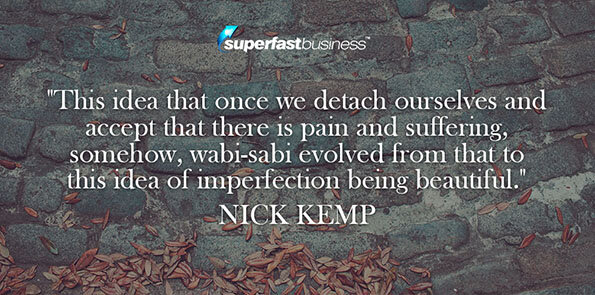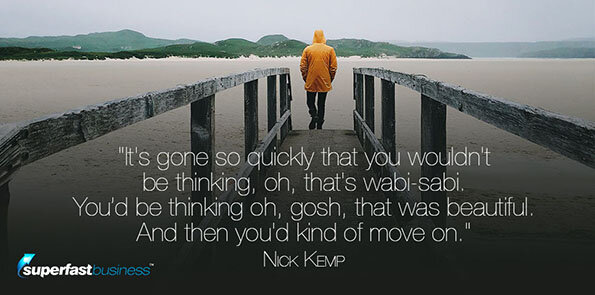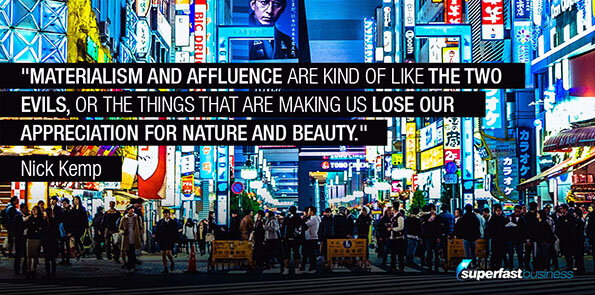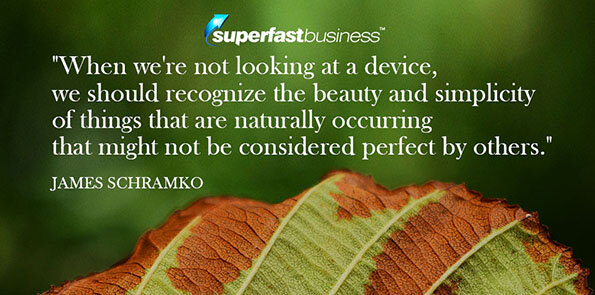Like ikigai, wabi-sabi is a Japanese term that has gained cultural traction in the West.
Most people understand it simply as the beauty of imperfection. What if, however, it was something deeper and more subtle?
We’ve invited back Japanologist Nick Kemp to define wabi-sabi as the Japanese do, and to discuss how having a sense of wabi-sabi can enhance our experience of life.
Podcast: Download (Duration: 25:33 — 23.5MB)
Get Notified Of Future Episodes Apple Podcasts | Spotify | Amazon Music | Android | Blubrry | Gaana | TuneIn | Deezer | Anghami | RSS | More
In the podcast:
02:20 – What we’ve covered so far in the series
03:39 – A first encounter with wabi-sabi
06:04 – Finding beauty in the imperfect
09:24 – Defining the term by what it’s not
11:53 – A couple of resources to refer to
14:03 – Exploring the etymology
15:45 – A detailed analogy of the concept
18:37 – Is wabi-sabi a dying aesthetic in Japan?
22:00 – Recognizing and seeking wabi-sabi
Deepen your fulfillment in life and business with help from James
Transcription:
James: James Schramko here, welcome back to SuperFastBusiness.com. This is Episode 774. I’ve brought my guest back, Nick Kemp. Welcome back.
Nick: Thank you, James. pleasure to be back on.
James: We’ve had some tremendous feedback from the first episode at this stage, about ikigai. We’ve had some heartfelt comments in my inbox. We’ve had some comments on the blog. People are resonating with this. Some people wish they could have joined in the discussion. Of course, they can do that over at your website, if they love this episode. We’ll talk about your website links, and we always list the resources in each episode. They will appear at Episode 774.
This is the third of a multi-part series. In Episode 772, we talked about ikigai, and what is Nick’s ikigai. And of course, Nick, you lived in Japan for 10 years. So you got a pretty good feel for the culture in that time.
Nick: I certainly did.
Yeah, I had the pleasure of living both in Tokyo and also where my wife’s from, which is a small village really, or a small town that’s famous for making Japanese pottery.
James: Right. I imagine being married to someone who’s Japanese, you get a deep insight into the culture compared to a regular person who’s just trying to learn the language online or something.
Nick: Absolutely. Obviously it’s changed my life dramatically. And there’s both good and bad. We won’t get into that. But yeah, it definitely changed my life.
Recapping the series so far
James: And what was your definition of ikigai? Let’s just recap that from Episode 772.
Nick: Okay. So my definition, it’s quite complex, or it’s quite long. So I wrote it down, but I’ll just say it off the top of my head. So I define ikigai as the small joys of life, daily rituals, building and maintaining meaningful relationships, fulfilling your life roles and pursuing a life goal with a healthy sense of urgency.
James: Nice. And we had a scoring system in that one. And we deconstructed the old Venn diagram and how that came to be and why it’s not accurate, etc.
Then we moved into Episode 773, which was kokorozashi. And that seems to be more in line with what that old Venn diagram was. And that was really fun talking about that. And it was a new word for me. And I’m sure our listeners are going to enjoy that. At the time of recording this, that hasn’t been published, but I expect it’s going to have a good impact.
And continuing on our journey, we’re in Episode 774. Today, we’re talking about wabi-sabi. And it is a fairly mainstream word. I bought a book on this topic. I’d love you to just take us through what this is all about.
Nick: Okay. I think I can start with a story. It’s actually the only word my father-in-law taught me. So it is a meaningful word for me. And there is a long story behind this, but we won’t get into that.
Nick’s first encounter with wabi-sabi
But basically, my father-in-law is a master potter. He’s actually a recognized craftsman in Japan. So I think this was happening when the Japan Korean World Cup was on, so I think that was maybe 2002 or 2004. I can’t remember. But he wanted to make traditional matcha jawans that he used in tea ceremony using traditional techniques.
So he purchased land, he had to purchase land on a hill, he got the community involved, he made an anagama, which is a mountain kiln, and made all these pottery pieces to fire in this mountain kiln. And he had to do it at certain times of the year, and it failed twice.
So it was a massive undertaking. And the first two times it failed, and he had to wait, like, basically a number of months before he could do that again. So the third time he had some success, and he was able to produce some pieces that he could sell.
And so one day, I’m in his koba, which is his factory, which is next to his house. And I’m looking at these two matcha jawans, these two tea ceremony cups. And one looked perfect. It had that symmetrical shape, it looked well balanced. It had the enso circle, that enso circle you see sometimes in black ink. And then there was this other one that was wonky, the glaze was slightly burnt. And it kind of drew your eye.
And he asked me which one I think would sell for more. And I was thinking, say the opposite of what you think. So I thought, well, this one that looks perfect, is probably what I’d normally say. So I’ll say the other one. But then at the last minute I said, no no man, it’s like, it has to be this other one. It’s like the perfect catalog image of a matcha jawan. So I said, that one. And then in Japanese he goes, Chigau. Wabi-sabi. Wabi-sabi. And then he’s just walked off.
And so he introduced this word to me, wabi-sabi, and I’m thinking, what does he mean? So I then left the koba, I left the factory, and asked my wife, what’s wabi-sabi? And she just couldn’t be bothered trying to explain.
So then I googled it. So this is in 2004 or 2005. And the only thing I could find was, like, an English book on interior design, or art. So I knew in some context that, okay, it’s related to pottery, and it involves perhaps natural elements like clay, fire, water, and wood. So that’s how I was introduced to this word.
The beauty of imperfection
James: So what does it mean?
“Wabi sabi is an aesthetic sense in Japanese art centered on the acceptance of transience and imperfection.”
Nick: Okay, well, I thought you were going to ask that question. So I’ve actually got a book here. It’s called The Japanese Mind. So I might read something from it. But wabi-sabi is a fundamental principle of Japanese art and tea ceremony. And a definition I found online is, it’s an aesthetic sense in Japanese art centered on the acceptance of transience and imperfection.
James: Because that’s the part that I was sort of familiar with. It’s kind of like, it doesn’t have to be a perfect type of approach. That’s sort of the little anchor that I had and why I was interested in it.
And this is particularly relevant to what I do, because when I’m coaching people, I do find people tend to try and line up all their ducks and get them in a row before they move forward. And the perfectionists are kind of cursed with this inability to progress, because they’re always trying to do things right instead of doing the right things, as Peter Drucker pointed out to me in one of his books. And I’ve always been fairly fast to move and not completing everything to perfection, and that’s okay.
And as you were talking about the teacup and not being perfect, it reminded me of my surf today. Because I took out my brand new board for the first time and I, when I receive a board, I measure them. And this board is hand-shaped. And it’s also got this special resin color. And it’s got four different colors on it. And the colors sort of bleed into the other and they’re not lined up perfectly, they’re sort of, one side bleeds into the other a bit.
And when I measured it, one side of the board is actually just, you know, a half or a quarter of an inch wider than the other side. And when you check it along the bottom contour, it’s not exactly even on both sides. Like, it’s really a very handmade thing. It comes from Byron Bay, and it took about six months to make.
But I actually treasure that more than a board that was cut on a machine, you know, in a sort of 3D printing style where they’re probably technically perfect, but they lack a bit of soul.
Nick: Yeah, I can understand that perhaps related to guitar. So there’s a beautiful handmade guitar, it’s not going to be perfect, but if it’s machine made, it doesn’t have that appeal. So there is this beauty of something being handmade, and not being, you know, symmetrical and perfectly colored.
James: And you know why I think this is super relevant now? We’re going to take this into a totally quantum level, is there are a lot of tools out there that produce things like funnels, templated things, and we’re moving into an age where AI will start being able to beat us in terms of writing content for our websites, and writing sales letters that are compelling and persuasive.
“More than ever, it’s important to have that handmade, human approach.”
I think, more than ever, it’s important to have that handmade, human approach. And one of the things that has never failed me is answering emails from my clients, and responding to people in person, on social media, and being there to actually support my customers in a way you cannot get from a robot or a machine or a templated help desk, etc.
So we have real people on our help desk with real answers. We even say that on our support page, speak to a human. Because I think as we go down this phase of automation and perfect-on-paper type technical produce, with the online goods, we’re going to notice human more. And those little imperfections will actually mean something, like the tea cup that’s not perfect but has more character.
Defining the term by what it’s not
Nick: Yes, I agree. So it’s interesting how in the West, we try to apply it to ourselves or to our work. And that’s something they don’t do in Japan. So that’s probably the biggest takeaway for us to understand, is Japanese wouldn’t write a book on how to wabi-sabi your life or how to accept yourself with wabi-sabi. That’s what Japanese don’t do.
So we could start almost like we did with ikigai and just define it as what it’s not.
James: Let’s go for it.
Nick: Everyone knows the Joe Rogan podcast. And he interviews David Lee Roth, and then within two minutes, I think even within the first minute of this podcast, Joe was sort of saying, “Oh, you’re looking good, how are you?” And Dave says, “Hey, have you ever heard the word waba sabi? That which is perfect because it’s effed up? And your favorite jeans are waba sabi. And Keith Richards.”
“In Japanese, they wouldn’t say it’s imperfect beauty. It’s probably better to go with themes of simplicity and elegance.”
So he butchers the word, absolutely butchers it, both in pronunciation and meaning. So the first thing we should understand, it’s not an adjective. So you don’t say this is a wabi-sabi cup or this is a wabi-sabi plate. It’s a noun. In Japanese, they wouldn’t say it’s imperfect beauty. See, it’s one of these words that you find very hard to explain. It’s probably better to go with themes of simplicity and elegance.
James: Well, that definitely describes a lot of my approach to the online business. I don’t have the most beautiful stuff, I don’t have the most incredibly detailed stuff. But I do produce a fair amount of stuff. And like these episodes, they’re done in one take. We’re just recording us having a conversation. I like that kind of organic stuff. And to me, I think this approach is super genuine and real.
I was watching Formula One last night, in Russia. And at the end of the race, the driver puts on his TAG Heuer before he goes up to, you know, the podium. Like, it’s just so staged. And so, you know, it’s all, like, tick the box, please the sponsors. It’s just, like, artificial. He didn’t wear the watch in the race, he’s not going to wear it five minutes after he goes back into his caravan. It’s like, I think, I don’t know, people like me are getting a bit jaded of that sort of contrived approach.
And the thing that appeals to me about this idea of wabi-sabi, this doesn’t seem contrived. I think f***ed up jeans sound contrived, if you take them out the back and fire guns at them and rub them over graters or something to get a certain look, that’s almost cheating.
Nick: Yeah, yeah. So that’s what it isn’t, is. And you’re right, we’re losing our authenticity or we’re losing our honesty every time these sportsmen succumb to sponsorship just to promote a brand and, themselves, make money.
A couple of resources to refer to
James: Talk about your favorite resources on this. Where did you learn from, a couple of books?
Nick: Yeah, so there’s a few books. One is The Japanese Mind. So if you just want to read a chapter and understand really the history of the word and what it means, that’s a good book. And then a really good book is this one by Beth Kempton.
James: That’s the one I have.
Nick: Yeah, so it goes into the history of the word and what it means and it breaks down wabi and sabi. But it also talks about how you can apply it to your life and your shopping and your interior design.
“Wabi sabi conveys the impression you are left with after an encounter with a particular kind of beauty, which may be visual, but could be experiential.”
So I will quote something from Beth’s book: “Wabi-sabi conveys the impression you are left with after an encounter with a particular kind of beauty, which may be visual, but could be experiential.”
So it’s something you sense. It’s not something you really, you see it, but you sense it. So it’s an experience. So that’s something we should keep in mind. And it’s also personal. So I could see something, and you might not see it, or you might experience something, and I might not experience. So it is personal.
James: Is it kind of like, you know, when I saw my daughter was attacking some food and had it all around her face and had the biggest grin on her face, and it’s like, it’s not perfect. She’s having the best time ever. And I, just in that moment, I thought, Wow, that’s such a beautiful experience for her, that pure joy of eating something delightful, and being messy about it, almost.
Nick: There might be some connection there. But it’s really, I think, something you can only experience in nature. Or perhaps in something really, in terms of Japan…
James: But a pottery’s handmade.
Nick: Yeah. So it’s something you can’t create, because there is this randomness to it. But for example, tea ceremonies, where they probably try and create wabi-sabi, in how they use very simple tools. They decorate the room with one flower. They’re very precise and elegant with their movements. And they are intentionally trying to create this aesthetic of wabi-sabi.
But no one could say, right, I’m going to make a wabi-sabi surfboard or I’m going to make a wabi-sabi guitar. You could fire pottery and hope, gee, I hope one comes out with the wabi-sabi aesthetic, but I’m pretty sure Japanese wouldn’t even think that way.
Exploring the etymology
James: So you said that wabi and sabi are two separate parts. You want to go through that?
Nick: Yeah, so wabi today is associated to good taste and refinement, and the beauty of stillness and simplicity. And there is a verb form, which is wabu, which is to be worried, to be grieved, too pine for. So it has various meanings. And then wabishi is miserable, wretched, lonely, dreary. So these are sort of the origins of the meaning of the word.
And then sabi today is related to the beauty of silence and old age. But the verb sabu is to lie in waste or to get to ruin or feel lonely or to get old. And sabishi is lonely, lonesome and solitary and desolate. Now, sabishi is the only word, the adjective sabishi is quite a common word in Japanese.
James: The rest of them sound pretty negative.
Nick: Yeah, so they’re rooted in Buddhism, and the acceptance that life is suffering.
James: That’s exactly what I was thinking. When I was in Thailand at this old tree near the golden reclining Buddha, they were telling us the story of Buddhism and how it’s basically complete detachment. It was like, you know, that’s like perfection in a way. So when I’m hearing words like silence and solitary and lonely, etc, that sort of reminds me of that, letting go of all the comfort and needing to be hugged, and, you know, knowing that you’re significant and all those things.
 Nick: Yeah, so yeah. We need to understand it is rooted in Buddhism, and this idea that once we detach ourselves and accept that there is pain and suffering, somehow, wabi-sabi evolved from that to this idea of imperfection being beautiful or beauty not being perfect.
Nick: Yeah, so yeah. We need to understand it is rooted in Buddhism, and this idea that once we detach ourselves and accept that there is pain and suffering, somehow, wabi-sabi evolved from that to this idea of imperfection being beautiful or beauty not being perfect.
An illustration of the concept
And a great analogy, I thought about, how would I best express wabi-sabi to your audience? So I sort of thought, there’s this cherry blossom analogy we can use. So imagine a salary man, and he’s got two kids and a wife. And it’s cherry blossom season. And he takes his family to the local park, where there are a few cherry blossom trees. And they’re in full bloom. And it’s absolutely beautiful. They’re vibrant, his daughter’s taking photos and putting it on Instagram, they have a picnic and a wonderful day.
Now, throughout that day, they would never experience wabi-sabi. Because the beauty is too explicit, and it’s too vibrant.
Now, imagine, a week and a half later, or two weeks later, the season’s pretty much ended. And this salary man’s walking home from work. And he’s cutting through the park. And he’s remembering, ah, that was a good day.
And he looks to the trees or to the branches to see if there are any petals left. And as he does, like, the last of the petals, like three or four kind of float down, and he stops walking to observe it. And then they hit the ground. And then the moment’s gone. But he senses something. And it changes his state, he actually feels better. So he feels connected to nature, he feels this inner peace. And he also senses a beauty behind that beauty.
And so he wouldn’t even identify it as a wabi-sabi moment. He wouldn’t go home and say, ah, this amazing thing happened. But there would just be something that would make him feel a little bit better. And then he’d move on with his evening.
James: Can you detect it, though? Like, can you say, oh, wow, this is incredible?
 Nick: Yeah. So I think you would stop and look at it. And I think, James, for some people who are religious, they might interpret it as God is talking to them, or an angel’s kissed them or something. They’ve been kissed by an angel. But I don’t think you’d stop and go, that’s wabi-sabi, because you’d be in the moment. And it’s gone so quickly that you wouldn’t be thinking oh, that’s wabi-sabi. You’d be thinking oh, gosh, that was beautiful. And then you’d kind of move on.
Nick: Yeah. So I think you would stop and look at it. And I think, James, for some people who are religious, they might interpret it as God is talking to them, or an angel’s kissed them or something. They’ve been kissed by an angel. But I don’t think you’d stop and go, that’s wabi-sabi, because you’d be in the moment. And it’s gone so quickly that you wouldn’t be thinking oh, that’s wabi-sabi. You’d be thinking oh, gosh, that was beautiful. And then you’d kind of move on.
James: Today on my surf, like, we had the best winter swells. And then we’ve had nothing for the last week, like seriously flat. Lake Manly here. Today was like a winter swell but in summer. I was supposed to be in the Maldives a few weeks ago, and it was really the closest I’ve had to that since last year when I was there. It was, like, glassy, clean, like no wind, could see every ripple of sand on the bottom. The sun was shining. Waves were a decent size and three to five feet.
I had my brand new board. The first wave I caught was one of the fastest waves I’ve ever caught. It was amazing. And it’s like, it’s one of those things you just think, oh my god, just like, you can’t describe this in words. And even though it was a Monday and there were about 30 people out, which is a lot for Monday, it’s just like, everyone else appreciated it too, like, wow, it’s on. It’s happening. This is remarkable. Nature’s really just stunning sometimes when it delivers like that.
A dying sense of the aesthetic?
Nick: Yeah, it’s these sort of serendipitous moments that are so short, you have to be present. So sort of just to add to that analogy, imagine exactly the same conditions. This salaryman is walking home, he’s cutting through the park, he remembers the day he had the picnic with his family. And instead of looking up, he pulls out his iPhone to look at Instagram photos his daughter posted, and he misses that moment. That’s what’s happening in Japan now.
James: I think it’s happening everywhere.
Nick: Yeah.
James: You don’t have to go far to… well, in normal times, depending where you live, probably not Victoria. But up here, if you’re walking out and about, you’ll see people looking at their phones when they’re walking, in cafes. And I’ve had Nir Eyal on my episode talking about, you know, how people are getting distracted. And you know, he’s the guy who wrote Hooked.
There’s been documentaries out there, like The Social Dilemma, starting to bring this to people’s attention. That’s what I love the most about the surfing. It’s absolute disconnection from tech. And I don’t even sit in this room I’m recording in usually for like four or five days at a time. I’m just away, away from it.
So do you think Japan is losing its sense of wabi-sabi?
 Nick: Yes, that’s what I wanted to say. Japan’s actually, probably, it’s been losing it for a while. And I guess the materialism and affluence are kind of like the two evils, or the things that are making us lose our appreciation for nature and beauty. We’d rather queue outside the Apple store for the next iPhone, rather than spend two days camping and walking in a beautiful forest.
Nick: Yes, that’s what I wanted to say. Japan’s actually, probably, it’s been losing it for a while. And I guess the materialism and affluence are kind of like the two evils, or the things that are making us lose our appreciation for nature and beauty. We’d rather queue outside the Apple store for the next iPhone, rather than spend two days camping and walking in a beautiful forest.
And things like these cultural things, like tea ceremony, they’re more of a practice as a throwback to the glory of the past, rather than actually doing it to appreciate it and enjoy it. So I asked a lot of my friends, in the last week, when was the last time you’ve done a tea ceremony? And they said, Oh, I haven’t done one for years.
And it’s not just tea ceremony. There’s all these beautiful arts and crafts that Japan’s losing because there are no apprentices learning these crafts. And these crafts do contribute to this, I guess this cultural wabi-sabi-ness.
James: Do you still do tea ceremonies, Nick?
Nick: Just this one.
James: I was thinking, after our call, I’ll be doing an espresso ceremony. I’m so keen to go to Japan. My wife’s been to Japan. And I know it’s got great snow, I know they make amazing performance cars, and there’s a whole surfing community. I’ve got a great friend on Instagram, tk_chas, who is posting surfing shots all the time. They have small waves most of the time. But it looks like a really vibey, cool culture, and I’m very excited to go there when all of this travel opens up again.
Nick: Yeah, I guess that’s the beauty of Japan. And also perhaps why the traditional arts and traditional culture is losing its presence, because there’s this modern culture, you know, manga and anime and things like surfing and the ski season. You probably know a lot of Australians go to Hokkaido, yeah?
James: They do, because our snow is rubbish in Australia.
Nick: Yeah.
James: We don’t have good snow.
They also seem quite innovative, you know, with their trains and things and electronics and so forth. They make good motorbikes, too.
Nick: Yeah. And maybe in a way, they’re kind of sacrificing aspects of their culture to evolve and to compete. And so I guess people can judge whether that is a good thing or not.
Recognizing and seeking wabi-sabi
 James: So the most important thing about this episode is to just take the concept of what wabi-sabi is. And I guess you’re saying we should recognize that out there, especially in nature. When we’re not looking at a device, we should recognize the beauty and simplicity of things that are naturally occurring that might not be considered perfect by others, and we could experience that moment.
James: So the most important thing about this episode is to just take the concept of what wabi-sabi is. And I guess you’re saying we should recognize that out there, especially in nature. When we’re not looking at a device, we should recognize the beauty and simplicity of things that are naturally occurring that might not be considered perfect by others, and we could experience that moment.
Certainly, I’m going to take a business approach to this and say, I’m going to keep producing stuff that’s organic, even if it’s not absolutely perfected or done on 17 rehearsals and so forth. I’m just going to keep making stuff. And some of it will be imperfect, but it’ll really hit the spot. Like that surfboard I had today, it’s such a good metaphor for me.
What’s your wish from this episode for someone listening to this, Nick?
Nick: Yeah, so a lot of Japanese might think that Westerners wouldn’t be able to understand wabi-sabi, and that they just don’t have the cultural sensitivity to. But I would like to think that the Western interest in wabi-sabi will remind Japan of this beautiful cultural aspect, or this cultural idea, or this cultural beauty, and that the Japanese could help non-Japanese understand it. So that’s what I think would be ideal.
“It’s okay for the West and authors to try and teach wabi sabi in a way that we’ll understand.”
And I think it’s okay for the West and authors to try and teach it in a way that we’ll understand. So we talked about it as interior design or accepting ourselves or even doing business that, hey, you don’t have to have the perfect studio setup, you can just whip out your iPhone and be yourself and talk for five minutes, that’s probably better. That is better than creating a facade that you’re someone else.
James: I love how this whole series started, which is, you know, you and I knowing each other through the SuperFastBusiness community, me observing you go through different phases of your life, and then you posting about what you’ve been up to, you know, especially with the ikigai, and your discoveries, and interviews, and so forth. And I invited you to come along and talk about that.
But I also am interested in the other cultural aspects of the words that might be useful tools for us, because I don’t think too many people are talking about some of the things we’ve talked about in these episodes. And I think there’s a few more left for us to talk about. So I hope that you can keep sharing these great philosophies with us, Nick.
Nick: I’d love to. it’s been an absolute joy to be on. And you know, we’re having this exchange of wisdom and knowledge, and it’s what is my ikigai, actually, my ikigai is intimacy. In this case, it’s intellectual intimacy. And we’ll leave this podcast episode both feeling more fulfilled and happier and grateful. So I’m very grateful.
James: Fantastic. So you’ve got resources over at IkigaiTribe.com.
I’m not an affiliate. I don’t have a rev share deal or anything. I just really like what Nick talks about. And so you should go and visit his site. Check out his resources. It comes from the heart, as you can tell, you know, if you’ve listened to all three of these episodes so far, you’re getting a good feeling for it.
If you’re not into the whole Japanese culture and what it means for us, then of course, skip ahead to the next episode that’s more business-related. But I really do enjoy these ones. I wanted to start making more personal episodes on this show, and to go into some areas that I haven’t delved as deeply before. So thank you for going on this journey with me, Nick.
Nick: Thank you, James. It’s been an honor and a joy and I look forward to our next episode.
James: Sweet. So this is Episode 774. You can look it up, we’ll fully transcribe it. We’ll link to any resources mentioned, especially Nick’s site, and I hope you join us on the next episode.
Discover world-class business and lifestyle coaching inside SuperFastBusiness (membership).
Enjoyed the episode? Leave us a review on iTunes









Leave a Reply